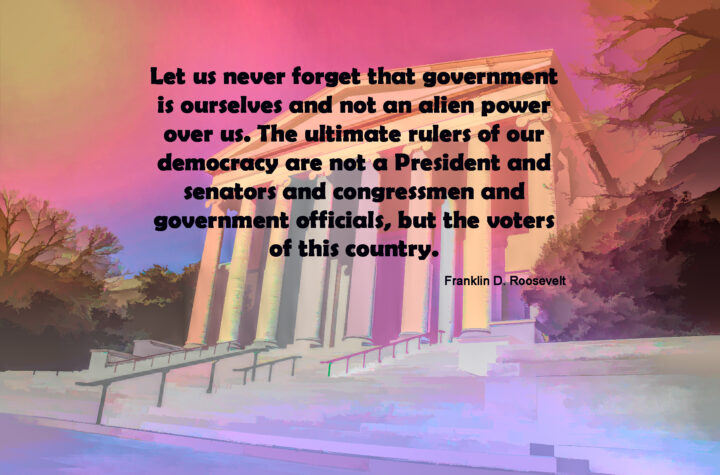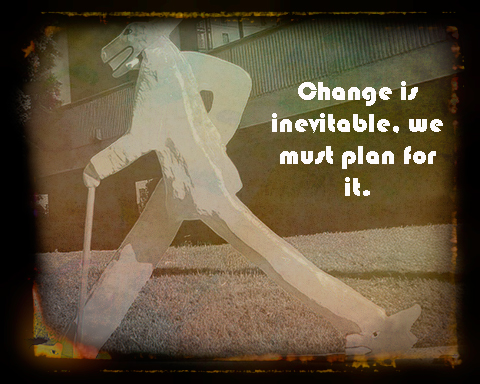
Good governance never depends upon laws, but upon the personal qualities of those who govern. The machinery of government is always subordinate to the will of those who administer that machinery.
What the government wants to do, and has the power to do, it will try to do – law, ethics, and common sense notwithstanding. Officials may pause at the outset of an undertaking for a nominal weighing of the pros and cons. This can involve elaborate cost-benefit analysis, preparing records, legal briefs, committee reports, environmental impact statements, and the like. Still it will be the enthusiasm of the proponent’s political power, rather than the merits of the case, that usually prove decisive. Once a major project begun, moreover, it will grow and create a life of its own. If it’s rationale is disproven or forgotten, if it produces unwanted side effects, or even if it fails utterly, the momentum it achieves – it’s weed-like vitality – will often be enough to sustain the program past the point where it should be curtailed or abandoned. Curiously, the more that is at stake the more this appears to be the case.
Given my role in local government I must admit that there are frequent times that leadership and authority is granted to those who are appointed rather than elected. It is the hired help that can provide a continued momentum rationale to ill-conceived ideas that no longer have public support. The public did not elect these administrators or managers. They do not expect them to lead but support the efforts of whom they elected. However, when an elected representative attempts to determine exactly what the voters want at any particular moment, they become troubled by the fact that what the voters want is to be told what they want. They also fall prey to these thoughts looking toward their staff (bureaucrats) to advise them what to do. Hence the delegation. Thomas Sowell, an economist, and social theorist opines. “It is hard to imagine a more stupid or more dangerous way of making decisions then like putting those decisions in the hands of people who pay no price for being wrong.” Therefore, it is the public that pays the price of inauthentic leadership. A voter is free to choose, but it must accept the consequences of that choice.



Thanks for this site. It’s really cool, but I think Herbert is wrong (for the most part) when he wrote in Children of Dune: “Good governance never depends upon laws, but upon the personal qualities of those who govern. The machinery of government is always subordinate to the will of those who administer that machinery. The most important element of government, therefore, is the method of choosing leaders.” (I actually added to the quote the sentence that followed, which I will explain in a second.) Never depends on laws? Tell that to Civil Rights Activists and how the country has changed for people of color, LBGT, women, children (as in child labor), etc. because of laws, regardless of the bastards who were governing. Trump gets away with a lot of shit, but imagine if we didn’t have many of the laws we have now. Having said that, and this is why I added to the quote, who we elect is very important, because there is always enough ambiguity in laws and enforcement to allow pieces of shit like Trump to f–k with groups they hate. So I agree in part with Frank (but disagree much more). Did you know McCarthy was his cousin? Herbert was a Republican, but probably more of a libertarian. Still, his small government leanings helps to explain the quote and his position. We need to be governed by laws, not men and women, first and foremost. But who we elect does matter.
I appreciate your perspective but where I thought I was going is what I read between the lines from the perspective of a bureaucrat what is often referred to now as the “deep state”. In short, it is my opinion that leaders should lead, not run government. That task belongs to the administrators that run the machinery of government. Unfortunately sometimes the machinery is so well maintained that it runs according to an agenda that the operators think is more efficient and more necessary than the electorate or the leader believes. From that perspective laws are one thing but she that administers the laws may be another.
By the way, I need to convince you to bring your comments to the site rather than Facebook. I also may wish to convince you to contribute to the site. I’ll drop in on you one night soon.
As a member of a minority group, we rely on rules as much as we can, because when the rules said that we had no rights, relying on white folks’ decency, integrity, etc. didn’t work out for us very well. That’s why laws, rules, etc. are so important for us. But even with rules, there is a lot a leader can do — just look at what Trump has done despite rules, norms, laws, etc. Imagine if we had none how much worse it would be. At least there are some constraints on him, protections for us. But a leader can also do a lot to make things better for everyone, as you note. But do we want to rely on a benevolent dictator? (I know that’s not what you are saying, but do you see my point?) I do think that leaders should be leading as you say (and not being bureaucrats, doing the day-to-day work of running a bureaucracy), uniting us, etc. UnfortunatelyTrump is “leading” too. The problem is that he’s leading in a way to ensure that gets at least 4 more years, and to hell the country and everyone opposed to him in it.